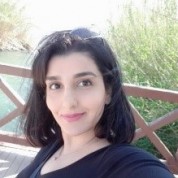Masters degree in Biology- Biochemistry

Nasrin Razmi
Bio
Nasrin Razmi is a first-year doctoral student in Material Science at Linkoping University, Sweden, working under the supervision of professor. Omer Nour and co-supervision of Professor Magnus Willander. Her main research interest centres around electrochemical sensors. Her current research is on electrochemical sensor for the detection of microbes in seawater which is supported by the European Commission through the AQUASENSE (H2020-MSCA-ITN-2018-813680) project. She received her Masters degree in Biology- Biochemistry, with the thesis “Elecrochemical Aptasensing of PDGF-BB growth factor using gold nanoparticles”. She holds a Bachelors degree in Cell and Molecular Biology- Biochemistry. Below comes list of her publications.
Qualification
Publications
- Aptamer based assay of plated-derived grow factor in unprocessed human plasma sample and MCF-7 breast cancer cell lysates using gold nanoparticle supported α-cyclodextrin
- Recent advances on aptamer-based biosensors to detection of platelet-derived growth factor
- Current advancement on diagnosis of ovarian cancer using biosensing of CA 125 biomarker: Analytical approaches Conferences: Hasanzadeh M, Razmi N (presenting author), Mokhtarzadeh A, Shadjou N, Mahboob S. An electrochemical aptasensor for detection of PDGF-BB in human plasma sample and MCF-7 breast cancer cell lysates, presented in The 15th Iranian National Congress of Biochemistry & 6th International Congress of Biochemistry & Molecular Biology, Department of Scientific Conferences of the University of Medical Sciences: Isfahan University of Medical Sciences, Isfahan, Iran, 27 Aug 2018.
- Conference papers: Hasanzadeh M, Razmi N, Mokhtarzadeh A, Shadjou N, Mahboob S. An electrochemical aptasensor for detection of PDGF-BB in human plasma sample and MCF-7 breast cancer cell lysates. Iran J Basic Med Sci. (abstract published, volume 22, 2019).
Project
RP5: Sensor for pathogens monitoring in water and food (ESR5, LiU)
The microorganisms (pathogens) which include fungi, bacteria, viruses, protozoa and worms cause disease in humans and other warm-blooded animals and are transmitted from one organism to another. These transmissions mainly occur by contamination of food/water or by direct contact. To measure the sanitary quality of water for agricultural, industrial, and water supply purposes, the fecal indicator bacteria such as Escherichia coli, fecal coliforms and fecal streptococci are typically used. These bacteria survive few hrs or days in surface water and live long in ground water due to protection from sunlight and predators. For drinking water, water purification is required to avoid the microorganism. However, there is no clear way to associate (1) risk of disease and the presence of fecal indicator bacteria which present in ground water and (2) no report of relation between the presence specific pathogens and of fecal indicator bacteria. In addition to this, for the growth of microorganism, an optimum pH level is more favourable. Hence, this project will develop innovative amperometric sensors to monitor the pathogens in the surface and ground water and determine their relationship with other parameters of water quality.
Project Supervisor
Host Institute
Linköping University, Sweden

